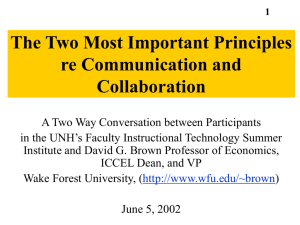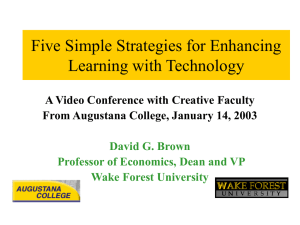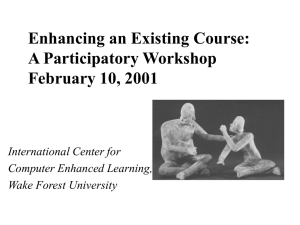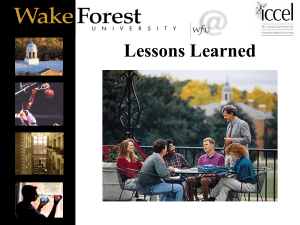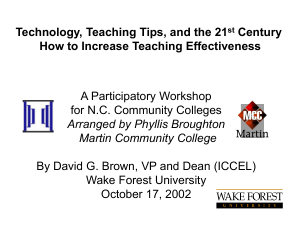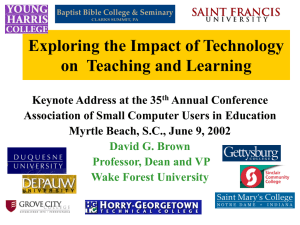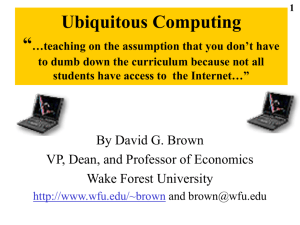How Can You Use “New Technology” to
advertisement
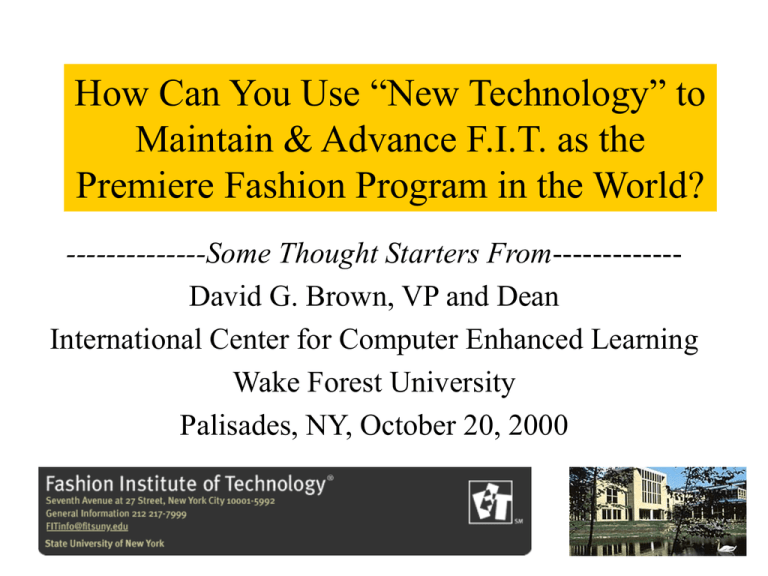
How Can You Use “New Technology” to Maintain & Advance F.I.T. as the Premiere Fashion Program in the World? --------------Some Thought Starters From------------David G. Brown, VP and Dean International Center for Computer Enhanced Learning Wake Forest University Palisades, NY, October 20, 2000 New options require rethinking all we do Our profession has new gardening tools. We want to learn which ones will be useful in stimulating growth in our own gardens. ICCEL -- Wake Forest University, 2000 Approach 1. You choose how world is changing 2. I suggest how Wake Forest & Dave Brown are taking advantage of the changes 3. We think together about how F.I.T. & you might take advantage of the changes ICCEL -- Wake Forest University, 2000 The New “Student” Mentality 1. Nintendo Problem Solving 2. Immediacy 3. Multi-Tasking & Channel Changing 4. Always In Touch 5. Open Information 6. Shared Authority & Second Opinions ICCEL -- Wake Forest University, 2000 Vote Once for Most Important The New University--slide 1 1. Bricks and Mortar Stay--including health clubs 2. Brokers Emerge--the most common function 3. Entrepreneurship Thrives--focus required 4. Libraries Become Resource Centers--help 5. Confederations Flourish--mergers too ICCEL -- Wake Forest University, 2000 Vote Once for Most Important The New University--Slide 2 1. International Alliances Multiply-not only distance education 2. Schedules Metabolize Around Commencement 3. Outsourcing Expands--services and courses 4. Funding Diversifies-mix public and entrepreneurial 5. Databases Center Around the Student-my.yahoo ICCEL -- Wake Forest University, 2000 Vote Once for Most Important The New Professoriate 1. Team Research--science methods spread 2. Electronic Publications--most rigorous format 3. Paper Archiving--most enduring format 4. Collaborative Teaching--design teams & confederations 5. Adjunct Faculty--alumni & practitioners 6. Institutes & Centers--departments & disciplines recede ICCEL -- Wake Forest University, 2000 Vote Once for Most Important The New Curriculum--Slide 1 1. The 80-20 Rule--not all F2F or Virtual 2. On Campus Distance Learning--3 residence, 2 by distance 3. Intimate F2F Classes--greater variability 4. Customized Textbooks--from many vendors 5. Learning Cohorts & Communities-essential for motivation ICCEL -- Wake Forest University, 2000 Vote Once for Most Important The New Curriculum--Slide 2 1. Lifelong Programming-email, portals, tech support 2. Continuous Communication-before & after degrees 3. The Student-Designed Degree-learning objectives & styles 4. The Math Emporium Model-one of the new models ICCEL -- Wake Forest University, 2000 Vote Once for Most Important Tomorrow’s Trio • Customization goodbye mass production • Community goodbye mass media • Change goodbye yesterday ICCEL -- Wake Forest University, 2000 THE WAKE FOREST PLAN IBM A20m, 500 Mhz, 11GB, 15”ActMatrix, CD-ROM, 90 modem • • • • • • • IBM Laptops for all Printers for all New Every 2 Years Own @ Graduation 45.000 Connections Standard Software 99% E-Mail ICCEL -- Wake Forest University, 2000 Computers Enhance My Teaching and/or Learning Via-Presentations Better--20% More Opportunities to Practice & Analyze--35% More Access to Source Materials via Internet--43% More Communication with Faculty Colleagues, Classmates, and Between Faculty and Students--87% ICCEL -- Wake Forest University, 2000 Computers allow people---• to belong to more communities • to be more actively engaged in each community • with more people • over more miles • for more months and years • TO BE MORE COLLABORATIVE ICCEL -- Wake Forest University, 2000 WHY COMPUTERS? …the faculty answer • • • • • • • Interactive Learning Learn by Doing Collaborative Learning Integration of Theory and Practice Visualization Communication Different Strokes for Different Folks ICCEL -- Wake Forest University, 2000 Ways of Thinking About Presidential Campaigns and Debates A First Year Seminar Introducing Students to the Liberal Arts 15 Freshmen Meet twice per week All with open laptops ICCEL -- Wake Forest University, 2000 Brown’s First Year Seminar • Before Class – Students Find URLs & Identify Criteria – Interactive exercises – Lecture Notes – E-mail dialogue – Cybershows • During Class – – – – One Minute Quiz Computer Tip Talk Class Polls Team Projects • After Class – – – – Edit Drafts by Team Guest Editors Hyperlinks & Pictures Access Previous Papers • Other – – – – – Daily Announcements Team Web Page Personal Web Pages Exams include Computer Materials Forever ICCEL -- Wake Forest University, 2000 Questions for F.I.T. • What is it that F.I.T. can do better than the rest of the world? • Why is F.I.T. uniquely positioned? • Taking into account the “new environment” and “new opportunities” presented by technology, what specifically should we be doing in the next several years? ICCEL -- Wake Forest University, 2000 Hypotheses to Consider— Faculty Development • Are current faculty eager to “try” CEL? • Should we emphasize the low hanging fruit? – email and listservs – URL addresses in syllabus – annotations within word documents – PowerPoint lecture outlines – mini-movies that show successive computer screens • Are most faculty interested in enhancing the Big Five – continuous communication – Repetition – controversy and debate – different strokes for different folks – outsider involvement • How about starting a Student Technology Advisors Program? ICCEL -- Wake Forest University, 2000 Hypotheses to Consider-- Curriculum • Should the faculty pass a motion that all teaching may proceed on the assumption that students have adequate access to the Internet? • How can we retain academic freedom for students and faculty in this era of open information? • Should teaching materials we prepare be separated into “enduring” and “short lived”? • To what extent should we emphasize each of these constituencies in our curriculum planning: prospective students, prospective employers of our students, our own convictions re what is best? • Does the new technology allow us to re-emphasize the apprenticeship model? If so, how can we best take advantage of it? • How do we best take advantage of the globalizing possibilities enabled by more robust communication systems? • Is the need for “fashion in cyberspace” an immense new “market” for our graduates? How can we anticipate the market for professionals who communicate in multimedia? • Does an “information fluency” requirement make sense? ICCEL -- Wake Forest University, 2000 Hypotheses to Consider– Global Education and International Linkages • • • • With whom can we partner globally? How can we encourage collaborative teaching? Are we budgeting for electronic data bases? What we will do locally that can be sold to other teaching institutions (so that we can in turn buy from them)? • Can we utilize adjunct professors from other cultures to help our students understand different cultural perspectives? • How can we increase the visibility of F.I.T. internationally? ICCEL -- Wake Forest University, 2000 Hypotheses to Consider— Technology and Distance Learning • Should we adhere to the 80-20 Principle? Show we plan F2F components for all virtual courses, and vice versa? • How can we build “loyal and trusting communities” for F.I.T.? • How can we strengthen our “brand identity”? • What about email forwarding for life for our graduates? • With whom can we partner in distance learning? ICCEL -- Wake Forest University, 2000 Hypotheses to Consider– Interdisciplinary Studies • How can we best both create and dissolve vibrant, interdisciplinary communities while preserving faculty and institutional stability? • Will most students of the future follow a customized curriculum? • How can we expand co-curricular activities and encourage “cross-fertilization” among learning communities? • What will be the implications of each student owning his/her data and ordering his/her activities via a personal web page? • Does it make sense to think of a technology subspecialization within many of our majors? ICCEL -- Wake Forest University, 2000 Hypotheses to Consider– Space and Facilities • Should most classes meet less frequently (the University of Central Florida model)? • How much space can be recaptured by substituting laptops for computer labs? • Is our computer network sufficiently robust? • How can we remove obsolete & little used equipment from our classrooms and laboratories? How can we resist acquiring industry’s equipment discards? • How can we reach a consensus re “the preferred” and “the minimum” hardware and software packages? • Is wireless computing a feasible alternative when so many of our students are on internships? • Do our spaces encourage the building and maintaining of ICCEL -- Wake Forest University, 2000 community? Tomorrow’s Trio • Customization goodbye mass production • Community goodbye mass media • Change goodbye yesterday ICCEL -- Wake Forest University, 2000 Questions for F.I.T. • What is it that F.I.T. can do better than the rest of the world? • Why is F.I.T. uniquely positioned? • Taking into account the “new environment” and “new opportunities” presented by technology, what specifically should we be doing in the next several years? David G. Brown Wake Forest University Winston-Salem, N.C. 27109 336-758-4878 email: brown@wfu.edu http//:www.wfu.edu/~brown fax: 336-758-4875 ICCEL -- Wake Forest University, 2000
